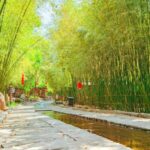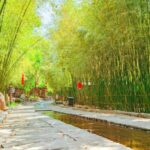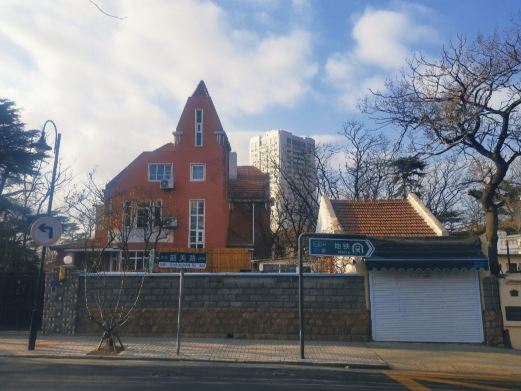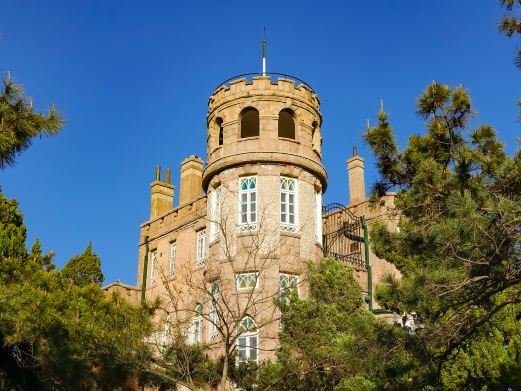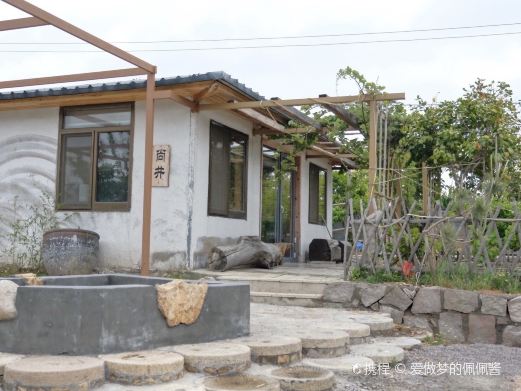Jiang Taigong Temple is located in Linzi City, and was built in 1993 based on the tomb of Jiang Taig[...]
Jiang Taigong Temple is located in Linzi City, and was built in 1993 based on the tomb of Jiang Taigong’s clothing and hat. The temple is a group of traditional Chinese axial symmetrical, palace and temple buildings. Inside the temple, there are the Hall of Three Kings, Qiu Zu Hall, Wu Zu Hall, Wu Xian Hall, Fishing Pavilion, Taoist Courtyard, and other structures, all grand in scale with numerous steles and lush greenery.
On the east side of Jiang Taigong Temple is Qiu Mugong Temple, which was funded by Mr. Qiu Zhengji, the hundredth generation descendant of Qiu Mugong and the Qiu family association, and constructed in 1995. Jiang Taigong was enfeoffed in Yingqiu, and his descendants took the land as their surname. Qiu Mugong, the third son of Taigong, was appointed by Taigong to govern Yingqiu after the establishment of Qi, and his clan took Qiu as their surname, making Mugong the progenitor of the Qiu family. Since the Zhou and Qin dynasties, the Qiu family has been prominent, with branches residing in various places and descendants spread both domestically and internationally.

The layout of both temples adopts the traditional Chinese architectural axial symmetrical sequence, with palace and temple arrangements that give the entire structure an antique charm. Inside the east wing of Qiu Mugong Temple, there are displays on the origins of the Jiang surname and the Jiang genealogy. The Jiang surname is one of the ancient surnames in China, and over the long course of time, the Jiang family has proliferated and spread across the world.
It is verified that there are 102 surnames that originate from the Jiang surname. King Wen of Zhou met Jiang Taigong, who was then invited back to serve as the grand master, respectfully known as Taigong Wang, and later King Wu of Zhou also revered him as Shangshifu. Jiang Taigong assisted the Zhou dynasty in overthrowing the Shang dynasty and was enfeoffed in Qi for his primary merit. Taigong governed Qi, implementing policies such as ‘adapting to local customs, simplifying rituals, and promoting commerce and industry, thus benefiting from the advantages of fish and salt,’ focusing on the joint development of agriculture, industry, and commerce, and vigorously developing production, which quickly made Qi a powerful state.
Later, Jiang Taigong also assisted in quelling the rebellion of King Zhou’s son Wu Geng, and in recognition of Taigong’s second great contribution to stabilizing the Zhou dynasty, King Cheng of Zhou granted Jiang Taigong the exclusive right to ‘extend from the sea in the east, to the river in the west, to Muliang in the south, and to Wu Di in the north,’ making it a major state that people from the Haidai region would travel to pay homage.
After Jiang Taigong’s death, he was buried according to Zhou rites, and the people of Qi, missing Taigong’s benevolence, buried his clothes and hat here.
The main hall enshrines statues of Jiang Taigong, Ding Gong Lv Qi, and the twelfth-generation grandson Xiao Bai, known as the first of the ‘Five Hegemons of the Spring and Autumn Period.’ The west wing enshrines statues of Tian Dan, Tian Rongju, Guan Zhong, Sun Wu, and Sun Bin. The east wing enshrines statues of Qiu Chuji (Changchun Zhenren), Lv Hongbin (Lv Zu), Zhang Daoling (Zhang Tianshi), Wang Xuannan (Taidao Dijun), and Wang Chongyang (Jiaozu).
Passing through the main hall, one arrives at the tomb of Jiang Taigong’s clothes and hat, expressing the people of Qi’s remembrance and admiration for Jiang Taigong, the founder of Qi and the cornerstone of Qi culture. The inscription ‘Zhou Shi Qi Zu’ on the stone archway at the tomb’s front highly summarizes Jiang Taigong’s life achievements. Opening hours are from 08:30 to 17:00 all year round.
Preferential policies for children: under 6 years old (inclusive) or with a height of 1.
Children under 4 meters (inclusive) are free. Elderly people aged 60 and above are free. Other free ticket groups: retired cadres (including retired military cadres), active servicemen, and people with disabilities (severely disabled people including one accompanying person) are free. Preferential groups for children/students: Minors aged 6-18 and full-time undergraduate and below students with valid certificates can enjoy half-price tickets.
High-level talents: With the ‘Shandong Huicai Card’, it’s free.

